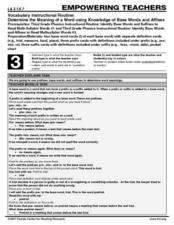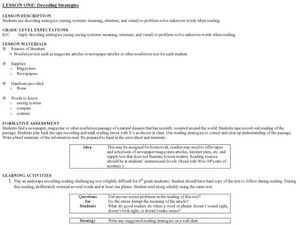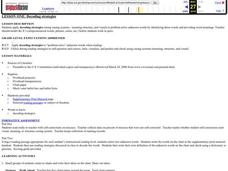Florida Center for Reading Research
Fluency: Words, Quick Sort
Peers work together to boost fluency by timing each other as they read and sort multisyllabic words. Record sheets keep track of participants' progress.
Meadows Center for Preventing Educational Risk, University of Texas at Austin
Lesson 13 - Multisyllabic Word Reading
One- and two-syllable words may flow from the tongue with ease, but longer words, such as department and volcano, feel like tongue twisters. Scaffolded instruction explains how to break words into their individual syllables, and then...
Curated OER
Identify Base Words and Suffixes to Read Multisyllabic Words #1
Show your scholars how adding an affix changes the entire meaning of a word; they focus on the suffix -able. You'll find a complete script here, but if you don't want to read this verbatim, use it simply as an outline. Learners watch you...
Curated OER
Word Origins
Understanding a word's etymology can really help with decoding and building vocabulary skills. Readers compare and contrast words of similar origins but with different difficulty levels. They focus on prefixes, suffixes, and affixes....
Meadows Center for Preventing Educational Risk, University of Texas at Austin
Lesson 10 - Compound Words
Individually, words have power, but when added together, they can take on a whole other level of meaning. Readers learn about compound words in the 10th of 17 lessons of the Word Recognition and Fluency series. A script provides guidance...
Curated OER
Vocabulary through Text
Explore word meanings. Sixth graders identify examples of words with affixes while listening to the story Paul Bunyan by Steven Kellogg. They participate in the game "Pass the Parts" and practice separating given words into their root...
Curated OER
Applying Decoding, Vocabulary, and During Reading Strategies
Apply reading strategies to boost phonemic awareness. While reading a provided informational text, learners use decoding, vocabulary, and a graphic organizer to strengthen their overall reading ability. Handouts and the reading passage...
Curated OER
Determine the Meaning of a Word Using Knowledge of Base Words and Affixes
Affixes can change the entire meaning of a word! Pupils practice with three prefixes and three suffixes in this scaffolded word meaning resource. There are affix cards here you can display in a pocket chart as you review. Learners first...
Curated OER
Lesson One: Decoding Strategies
Review decoding strategies to read a chosen text. Readers tape themselves reading out loud, listen to the recording, and mark where they have misread words or phrases. They then discuss which words were misread and review how to correct...
Curated OER
Decoding Strategies
Young readers apply decoding strategies to identify unknown words. In this reading instructional activity, they read the Preamble and practice using decoding strategies. Small groups rotate to five charts that have questions regarding...
Florida Center for Reading Research
Advanced Phonics: Morpheme Structures, Compound Construction
A phonics lesson focuses on morpheme structures—compound words. Pairs choose letter cards, identify a compound word that starts with that letter and write it on a whiteboard. Extension opportunities include additional practice pages.












